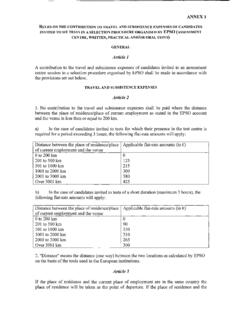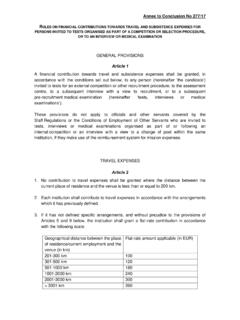Transcription of HM Treasury Group travel and expenses policy
1 HM Treasury Group travel and expenses policyincluding guidance on travel , subsistence , entertainment and hospitality, gifts and other expenses claimsJune 2013HM Treasury Group travel and expenses policyincluding guidance on travel , subsistence , entertainment and hospitality, gifts and other expenses claimsJune 2013 Crown copyright 2013 You may re-use this information (excluding logos) free of charge in any format or medium, under the terms of the Open Government Licence. To view this licence, visit or email we have identified any third party copyright information you will need to obtain permission from the copyright holders enquiries regarding this publication should be sent to us at You can download this publication from 1 Contents Page Chapter 1 Introduction and general principles 3 Claims 4 Corporate cards for T&S use 4 Other miscellaneous expenses 4 Chapter 2 travel expenses 5 travel by rail, sea.
2 Air and taxi on official business 5 Overseas visits 7 travel insurance 7 Hire cars and use of private vehicles 8 Hire cars 8 Mileage limits and allowances 8 Advance of salary for the purchase of season tickets and bicycles 9 Chapter 3 subsistence expenses 11 Overnight expenses 12 Training course expenses 13 Miscellaneous expenses 13 Permanent transfer/long term detached duty 13 Evening dress allowance 14 Chapter 4 Working lunches and official entertainment 15 Official entertainment 16 Team work based training 16 Expenditure on official gifts 17 2 Annex A Summary of policy 19 Annex B Ministers and Special Advisors 23 travel by Ministers 23 Special Advisers 24 Annex C General principles 27 Annex D travel tips 29 Annex E travel arrangements outside policy 31 Proforma for approval 32 Annex F Taxis 33 Annex G travel insurance 35 Annex H travel by car 37 Use of private vehicles 37 Motor insurance 38 Annex I Overnight accommodation and subsistence 39 Accommodation standards 39 Discounted accommodation 40 Annex J Taxable travel expenses 41 Home to office travel
3 expenses 41 Accommodation expenses at or close to your place of work 41 Secondment 41 Two places of work 41 3 1 Introduction and general principles Welcome to the HMT travel and subsistence manual. This manual provides details of the principles, rules and procedures relating to travel and subsistence for HMT staff. A short version of this manual, summarising the key points can be found at Annex A. The Civil Service Code states that civil servants must make sure public money and other resources are used properly and efficiently: The Civil Service Management Code sets out specific guidance on the principles that departments should apply to expenses ; S : Departments and agencies must reimburse staff only for expenses which they actually and necessarily incur in the course of official business.
4 And S : Departments and agencies must ensure that their rules provide for claiming recompense, including verification and authorisation . These principles build on the Management Code and should be applied irrespective of the type of expense involved: only costs which are necessary and additional to normal daily expenditure should be reimbursed; departments will reimburse actual costs only (within limits to be agreed by each department); all claims for expenses should be receipted and independently approved; audit processes should be in place to review claims on the basis of risk, quantum, nature of expense, or random selection.
5 Departments should manage reimbursement by exception rather than by reference to entitlements policies should not cover every eventuality (which risk setting precedents that are later difficult to address) but require explanations of out of policy actions for the circumstance of a particular claim; claims should include a clear business reason where travel is other than standard class; and line managers should oversee the frequency of travel and associated expenses . In any cases of doubt as to how the rules apply in a particular case, advice should be obtained from Finance Operations before expenditure is incurred.
6 Any exceptions to the requirements set out below must be agreed in writing with Finance Operations. Otherwise any incurred expenses may not be reimbursed. HMT will reimburse staff for expenditure necessarily incurred on travel and subsistence (T&S) in the course of official business. Staff are responsible for ensuring that no unnecessary costs are incurred and that HMT receives good value for money. 4 Ministers and Special Advisers: expenses and travel claims for Ministers and Special Advisers should also follow the principles in this manual as far as possible.
7 Claims made outside this policy will only be allowed where they can be shown to be within relevant provisions of the Ministerial Code or Code of Conduct for Special Advisers (available from the Cabinet Office website). A summary of the provisions of these Codes is included at Annex B. Further information on these principles can be found at Annex C. travel tips Before incurring expenses , travellers should ask themselves Do I need to make this journey? Further information on these principles can be found at Annex D. Claims Reimbursement of UK travel and subsistence expenses , including detached duty and permanent transfer costs, is to be claimed via the iExpenses module of Oracle Financials.
8 Claims should be made as soon as possible on completion of the travel and always within one month. Claims can be made after each journey. Specific arrangements are available for anyone on long-term absence; please contact Finance Operations for advice. Failure to action a claim in iExpenses within 90 days will result in auto-deletion of the claim from the system. Any claims submitted after three months may be declined for payment and will, in all cases, require an explanation for delay in submission. Remember to make sure that you keep your receipts if you intend to claim, without them a claim may be refused.
9 In the event that you have mislaid or been unable to obtain a receipt you must ensure that you tick the relevant box on your iExpenses claim, as this will ensure payment isn t delayed and clearly state the reason for absence of a receipt. Claims may be rejected (and payment delayed) if they are not properly authorised. Responsibility for accuracy of claims rests with the claimant and line management. The role of Finance Operations is to process claims in accordance with the guidelines and provide management information. Corporate cards for T&S use A convenient method to pay T&S expenses is to use the facilities offered by the HMT s official corporate payment card.
10 This card acts in the same way as a normal credit card when paying T&S related bills. Transactions incurred on the card will auto-populate your claim in iExpenses, making the claim process less onerous. Please contact Finance Operations if you wish to apply for a corporate card. Other miscellaneous expenses Section 3 outlines which miscellaneous expenses may be claimed through iExpenses. Other miscellaneous business expenditure should be handled in accordance with normal procurement arrangements (the use of the GPC card and/or purchase requisition process in iProcurement) and must not be included as part of a T&S claim.



















